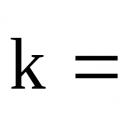Message about the empty space. History of the Zmievsky region
Vasily Pustovoit was born on January 14, 1886 in the village of Taranovka, Ukraine. He graduated from a local school and a city college in the city of Zmiev. In 1907 he graduated from the Kharkov Agricultural School, in next year pedagogical class with him.
From 1908 to 1918 Pustovoit taught at the Kuban Military Agricultural School, and from 1909 he was an assistant to the school manager. He worked part-time as an agronomist in the village of Petropavlovskaya, Krasnodar Territory. Introduced treatment of wheat seeds before planting to protect them from pests.
In 1912, he organized the Kruglik experimental selection field at the Kuban Agricultural School, later renamed the All-Union Research Institute of Oilseeds. Conducted experiments with sunflower, winter wheat, rye, millet, corn and castor beans.
From 1918 to 1924 he taught at the Kuban Agricultural College. Since 1924 he directed the breeding station of oilseeds.
In 1926 he graduated from the Kuban Agricultural Institute and became head of the department of genetics, selection and seed production of the Kuban Agricultural Institute. He held the position until 1930.
Pustovoit Vasily was arrested in August 1930 on a false denunciation and sentenced to 10 years in the camps. In the camp he was engaged in the selection of local crops. In May 1934, he was released early and appointed Director of the Central Experimental Field of the Karlag Karaganda camp. He developed a productive variety of rye and two types of millet on the experimental field he created.
Since May 1936, he headed the department of selection and seed production of oilseeds and the sunflower selection laboratory of the All-Union Scientific Research Institute of Oilseeds in the city of Krasnodar. One of the initiators of sunflower selection for high oil content. Developed new highly effective breeding systems for improving sunflower seed production. Created 34 varieties of sunflower.
Vasily Stepanovich developed issues of agricultural technology and selection of sunflower, wheat and corn, and studied the problems of agriculture and crop production. He laid down a new direction in sunflower breeding for oil quality using interline hybridization, which culminated in the creation of the world's first high-oleic variety Pervenets. Successfully solved the problem of creating broomrape-resistant sunflower varieties. Developed a new sunflower seed production system based on annual variety renewal.
Pustovoit was an Academician Russian Academy Sciences and the All-Union Academy of Agricultural Sciences named after V.I. Lenin. Three times elected as a deputy of the Supreme Council Russian Federation. Awarded the academic degree of Doctor of Agricultural Sciences.
In the city of Krasnodar, a bronze bust of V.S. was installed to the Academician. Pustovoit on the territory of the All-Russian Research Institute of Oilseeds named after V.S. Pustovoit, Kubansky Agrarian University and a monument at his grave. Streets in the cities of Krasnodar and Armavir, Krasnodar Territory, are named after Vasily Stepanovich. The tanker Akademik Pustovoit was named after him. Named after him high school No. 100 of the city of Krasnodar.
For special services in the development of agricultural science, he was twice awarded the Honorary title “Hero of Socialist Labor” and “Honored Scientist of Russia.” Awarded three Orders of Lenin, the Order of the October Revolution, the Red Banner of Labor, twice the Badge of Honor, G. Dimitrov, the gold star of the Order of Brotherhood and Unity.
Laureate of the Lenin Prize for the development of selection and seed production methods, the creation and widespread introduction of high-oil varieties and annual variety renewal of sunflowers and the Stalin Prize of the 2nd degree for the development of high-oil and drought-resistant sunflower varieties, which are widely used in agriculture.
Pustovoit Vasily Stepanovich)
 Reaction rate constant Guidelines for laboratory work
Reaction rate constant Guidelines for laboratory work Is there life after death?
Is there life after death? Scientists: Earth is a “space prison” for humanity scientists: Earth is a space prison in the universe
Scientists: Earth is a “space prison” for humanity scientists: Earth is a space prison in the universe